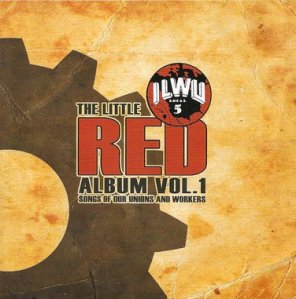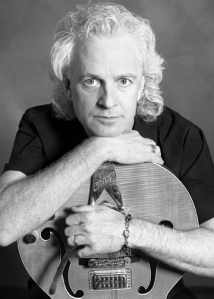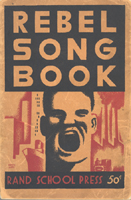In Portland, Oregon, workers at Powell’s Books are represented by the International Longshore and Warehouse Workers, Local 5. In 2000, Powell’s employees secured their first contract after a prolonged organizing campaign that received quite a bit of media attention. Last year, ILWU Local 5 released an album entitled The Little Red Album, Vol. 1 to commemorate the local’s ten year anniversary. The songs on the album, many of which were written by the legendary Swedish immigrant and IWW member Joe Hill, are almost all performed by rank and file members of Local 5. The array of talent showcased on The Little Red Album, Vol. 1 is impressive, and the songs are performed in unique, unorthodox ways. You won’t find the folk-styles that usually accompany labor songs on The Little Red Album, but you will hear indie-rock, punk, and electronica versions of “Should I Ever Be a Solider,” “Casey Jones, The Union Scab,” “Mr. Block,” and other classic songs of labor and protest. Recently, I posed a few questions about The Little Red Album, Vol. 1 to the album’s producer, Bryan Bingold, a rank and file member of ILWU Local 5.
First of all, how did you personally become interested in labor songs?
After working for a big unionized grocery chain for years and then moving to Powell’s, I was struck by how many co-workers were generally more interested in the union and it rubbed off on me. I had already decided that my focus, lyrically, with music would be to promote social change. After reading some Emma Goldman, some Noam Chomsky and hearing the Billy Bragg/Wilco Mermaid Avenue albums, it just made sense. Then there was the PBS documentary, Peter Seeger: The Power of Song. Soon after that, I found the Little Red Songbook and it all sort of clicked.
Can you talk a bit about the history behind The Little Red Album Vol. 1? What inspired you to produce this album?
A couple of years ago, I was researching the IWW and Woody Guthrie and came across the Wobblies’ Little Red Songbook. A couple of minutes later I came across a book published in 2007 called the Big Red Songbook, containing over 250 IWW songs collected by Archie Green. When I was able to get my hands on a copy, it became pretty clear that there was no copyright on any of the lyrics. At first this was going to be an EP that I was thinking about putting out. But I soon went to a house show in Portland, where all three bands contained a coworker of mine. It became clear that the unionized work force at Powell’s books had in it’s rank and file more than enough musical talent to have an entire album. A couple of weeks after the house concert, I approached the ILWU Local 5 and asked them if they would be interested in putting it out as a fund-raiser for the Local’s strike fund. It was perfect timing, as our Local was coming up on it’s 10th Anniversary, and a concert was already being planned to celebrate. We made it so that the album’s release was the night of Local 5’s 10th Anniversary, and had a benefit concert called The Rock Out To Walk Out.
Are most of the musicians on the album ILWU members? How did they become involved in the project?
Every musical act on the album (with the exception of Caius) contains at least one ILWU member, many of them are JUST ILWU members playing multiple instruments. Once I knew that the Local was behind the project, all it took was asking co-workers either in person or through email if they would be interested. After confirming at least enough people to express interest, we then opened it up to the Local’s general membership and received a bunch of interest. Over time, some people had to excuse themselves from participating just because of life, and what remained is on the album.
One of the most unique aspects of The Little Red Album Vol. 1 is that the songs are played in a wide variety of contemporary styles. Many singers perform labor songs in a folk style, but on this album, one can hear the influences of indie-rock, punk rock, and electronica music. Was this a conscious decision? How have listeners reacted to these modern interpretations of classic labor songs?
From the beginning, I wanted to have newly composed music to all of the songs. I thought it would grab a wider audience if the music was contemporary, and, hopefully, fans of the music might pay attention to the lyrics. A lot of the lyrical themes on the album are as prevalent today as the day they were penned. Also as a songwriter, it’s an interesting challenge to compose a song with the limitations of the lyrics already written, especially if the rhyme scheme lends itself to folk tradition. Myself and other contributors to the album struggled with trying to NOT write a Woody Guthrie or Johnny Cash-style of song.
How did the musicians choose which songs to record for the album? More than half of the songs were written by legendary songwriter and IWW member Joe Hill. Is there a connection between some of the musicians and the Portland branch of the IWW?
I left my copy of the Big Red Songbook at the Local’s office and was eventually able to donate it to them and there was a website with the contents of the 1916 Little Red Songbook. The artists had their choice in picking their songs, on a first come first served basis. I think only two had to choose another song, but the benefit of asking the musical acts to write their own music to these lyrics is that you could have 10 completely different tracks that all use the lyrics to “The Tramp,” and it could be pretty fantastic. The fact that most of the lyrics were written by Joe Hill was a happy accident, and a confirmation of his great lyrical ability that so many songwriters would choose his words for their music. The only overt Wobbly connection was that the album was mastered by a friend who had connections to the Wobbly music scene, Max Skewes. The individual bands may have Wobbly connections, but there wasn’t a straight connection.
The liner notes are written by the well-known British folk-punker Billy Bragg. How did that come about?
Mary Winzig, Local 5’s first president and driving force behind the unionizing of Powell’s workers, had connections and a history with Billy Bragg. We simply asked her if it would be possible to ask him if he would. There’s a great article about Mary and she tells of meeting Billy in a Powell’s store in 1998 here: http://www.ilwu.org/?p=2826.
Will there be a Little Red Album Vol. 2?
We hope to get started getting one together sometime in 2012. As well as having more Rock Out To Walk Out benefit concerts. We have a lot of ideas and more than enough lyrics in the Big Red Songbook to make numerous volumes of the Little Red Album. The idea that excites us most is inspiring enough musical acts to write their own contemporary labor songs with no help from the Big Red Songbook and put out an album of entirely original labor songs. A lot of that depends on the sales of the first Little Red Album, though!
Tracks featured on The Little Red Album, Vol. 1:
1. Should I Ever Be A Soldier-lyrics: Joe Hill, performed by Michael Ford
2. The Banner of Labor-lyrics: unknown, performed by Lovejoy
3. Ta-Ra-Ra Boom De-Ay-lyrics: Joe Hill, performed by ¡Ay, Claudia!
4. The White Slave-lyrics: Joe Hill, performed by Nate Ashley and The Picknicking Friends
5. My Wandering Boy-lyrics: unknown, performed by The Legendary Black Mark Savage
6. The Hope of the Ages-lyrics: Edith Nesbit, performed by Caius
7. Casey Jones, the Union Scab-lyrics: Joe Hill, performed by The Mysterie Play
8. Mr. Block-lyrics: Joe Hill, performed by The Middle Ages
9. The Tramp-lyrics: Joe Hill, performed by Michael Ford
10. The Rebel Girl-lyrics: Joe Hill, performed by The High Divide
11. Hark! The Battle is Ringing-lyrics: H.S. Salt, performed by L’Acephale
To purchase The Little Red Album, Vol. 1, visit Local 5’s website at: http://www.ilwulocal5.com/buy-local-5-merchandise



